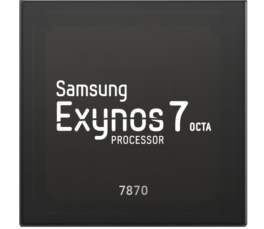Samsung Goes Midrange With Exynos 7 Octa 7870 14nm FinFET Chip
Get Tom's Hardware's best news and in-depth reviews, straight to your inbox.
You are now subscribed
Your newsletter sign-up was successful
Samsung announced the latest chip in the Exynos 7 Octa series, the Exynos 7 Octa 7870. The chip will be built on the company’s “most advanced” 14nm FinFET process, which probably refers to the 14nm Low Power Plus (LPP) process. (Samsung’s Exynos 7 Octa 7420, found inside the Galaxy S6, was built on the 14nm Low Power Early [LPE] process.)
“With increased performance and power efficiency, we anticipate widespread adoption of our new Exynos 7 Octa 7870 into mid-tier mobile devices,” said Ben K. Hur, Vice President of System LSI marketing, Samsung Electronics. “Consumers will experience enhanced performance as this is the first time a mobile application processor built on advanced 14nm process is available for these types of smart mobile devices,” he added.
The Exynos 7 Octa 7870 is actually a mid-range chip, which comes with eight 1.6 GHz Cortex-A53 cores. It will be the first midrange chip for smartphones to be built on a 14nm FinFET process, according to Samsung. It supports Cat. 6 LTE with carrier aggregation, which reaches 300 Mbps download speeds.
The chip also supports 1080p 60fps video playback and WUXGA (1920×1200) display resolution. Its image signal processor (ISP) can support either a 16MP rear camera and a 16MP front-camera, or two 8MP dual-cameras for the front and back. The chip integrates both GPS and GNSS, which can enable quicker location fixes in apps and services.
Samsung’s new midrange chip may signify that Samsung is ready to expand its chip lineup so it can use its own chips in more of its devices. So far Samsung has only focused on making high-end chips for its flagship smartphones and tablets. If it can prove that its chips are competitive, it may even start selling them to other OEMs and become a competitor to Qualcomm and Mediatek.
The midrange Exynos 7 Octa 7870 will be in mass production in the first quarter of this year. It should be accompanied by the high-end Exynos Exynos 8 Octa 8890, which should also ship in the first half of this year, likely in the international version of the Samsung Galaxy S7, for the first time. The Exynos 8 Octa 8890 will bring Samsung’s first-ever custom 64-bit CPU core, along with ARM’s latest Mali-T880 GPU, Cat. 12/13 LTE and support for 4k displays.
Lucian Armasu is a Contributing Writer for Tom's Hardware. You can follow him at @lucian_armasu.
Get Tom's Hardware's best news and in-depth reviews, straight to your inbox.
Lucian Armasu is a Contributing Writer for Tom's Hardware US. He covers software news and the issues surrounding privacy and security.
-
ScrewySqrl With Intel all but abandoning speed gains for future cpus, how long before mobile CPUs are faster than desktop?Reply -
ErikVinoya ReplyWith Intel all but abandoning speed gains for future cpus, how long before mobile CPUs are faster than desktop?
Intel is only abandoning speed gains in exchange of improved power consumption. Mobile devices are much more limited in power compared to a desktop so... -
rush21hit I can't wait for the ever more complex graphical fidelity and gameplay mechanics on gadgets. If anything comes with these chips are cheap and popular enough, it will bridge the path to it. Everything the chip has looks quite promising.Reply
So excited.
*damn, my tab4 8.0 suddenly feels old... -
cptnjarhead This is the reason VR will succeed. Mobile phones are tied to VR, the Tech is growing exponentially. In a few years, our phones will be able to perform stand alone VR that will rival the current VR that is tethered to a PC today.Reply -
alidan ReplyI can't wait for the ever more complex graphical fidelity and gameplay mechanics on gadgets. If anything comes with these chips are cheap and popular enough, it will bridge the path to it. Everything the chip has looks quite promising.
So excited.
*damn, my tab4 8.0 suddenly feels old...
yay, i get to play a crappy game due to the platform its on, but it will look pretty.
